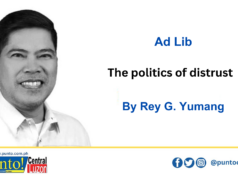“IT WILL take more than quiet words to change this status quo protected and secured by political dynasties who will not yield their monopoly of political power and the economic elite that established a new monarchy, the monarchy of the moneyed, and will not — never — give up their throne.”
On Saturday, former Chief Justice Reynato Puno raised the spectre of class conflict as driving, and dividing, force in the resistance to the shift to federalism.
Furthered Puno: “Their factotums are everywhere, ensconced from within the government and encompassed by business interests organized as cartels and oligopolies, with [an] evil eye [cast on] crusaders for change.”
From within the government, there was Socioeconomic Planning Secretary Ernesto Pernia earlier telling the Senate: “Expenditure will be immense if we go to federalism, and we estimate that the fiscal deficit to the GDP [gross domestic product] ratio can easily jump to maybe 6 percent or more, and that’s really going to wreak havoc in terms of our fiscal situation.”
Finance Secretary Carlos Dominguez seconding: “If Ernie [Pernia] is right, if we don’t manage this correctly, this can end up to be a fiscal nightmare. So, I think the legislature, in its wisdom, can sort those issues out.”
Dominguez candidly: “I had a long discussion with them (consultative committee) and, quite frankly, I was more confused than when I started.”
Then, there was Defense Secretary Delfin Lorenzana declaring the country is not yet ready for federalism as the people have a scant knowledge of the system.
No, Puno did not say the three senior Cabinet secretaries are in fact whom he meant as “factotums” of the political and economic elite resisting federalism. He did not have to. Correct is Puno in admitting to the general public’s ignorance of federalism, as Lorenzana earlier acknowledged. Hence, his push for a massive public information campaign.
Said Puno: “We should tell the people that federalism will end the culture of undue dependence on the central government, their compelled mendicancy from distant government officials who are unaware of their problems, hence unable to provide their solutions.”
Again, correct is Puno. But ending “undue dependence on central government” can only worsen local political patronage, thereby further entrenching the political dynasties.
As things stand now, that “distant government” that is the national level is ably, if dubiously, bridged by the local government units, dominated by families of politicians. What Puno calls “compelled mendicancy” is institutionalized pauperism on local grounds, feeding on political largesse.
And with federalism’s grant of greater fiscal and taxation powers to the regions comes more funds for the LGUs to sustain political patronage.
Even the idiot in me can comprehend that. So, what is there in federalism for the political dynasties to resist, Puno? Further buttressing as it shall their “monopoly of political power.”
Utopian is Puno at best then: “Federalism is for freedom for our poverty-stricken countrymen, in our different regions, real freedom to direct their political and economic destiny, and save them from a future of futility.”
As, it shall not be the people in the different regions that shall exercise that “real freedom” under federalism but the elite who hold socioeconomic and political control in these regions.
Why, federalism will even make that control easier to maintain – what with senators elected per region! Much reduced from its national scope, senatorial elections would translate to much lesser expense for the local oligarchies in purchasing the victory of their chosen candidates, their own kin naturally.
By another name, federalism is feudalism.
Its decentralization of government to 18 regions/states parallels the established fiefdoms of old – ran by the lords to the manor born, in strict hereditary line. Just like the political dynasts of our time.
Where the fiefs contended in crafts, commerce, trade, even territories, many times leading to pocket wars among them – thereby giving rise to warlordism – the regions shall now compete for investments, foreign and local, with the least potentials of development among them falling by the wayside. Just think: How shall fare calamity-devastated Eastern Visayas against Central Luzon with its international airport, two seaports, infrastructure network, ecozones, expanse of agri lands, vast human resources?
Dense as I am so I cannot see the least possibility of federalism ever saving the poor regions of the country from what the erudite ex- CJ Puno said as a “future of futility.”
Thick as it is, I have of the mind though that the feud that federalism wrought within Duterte’s Cabinet, and its close correspondence to feudalism, birthed here some mutant I can only call “feuderalism.”




